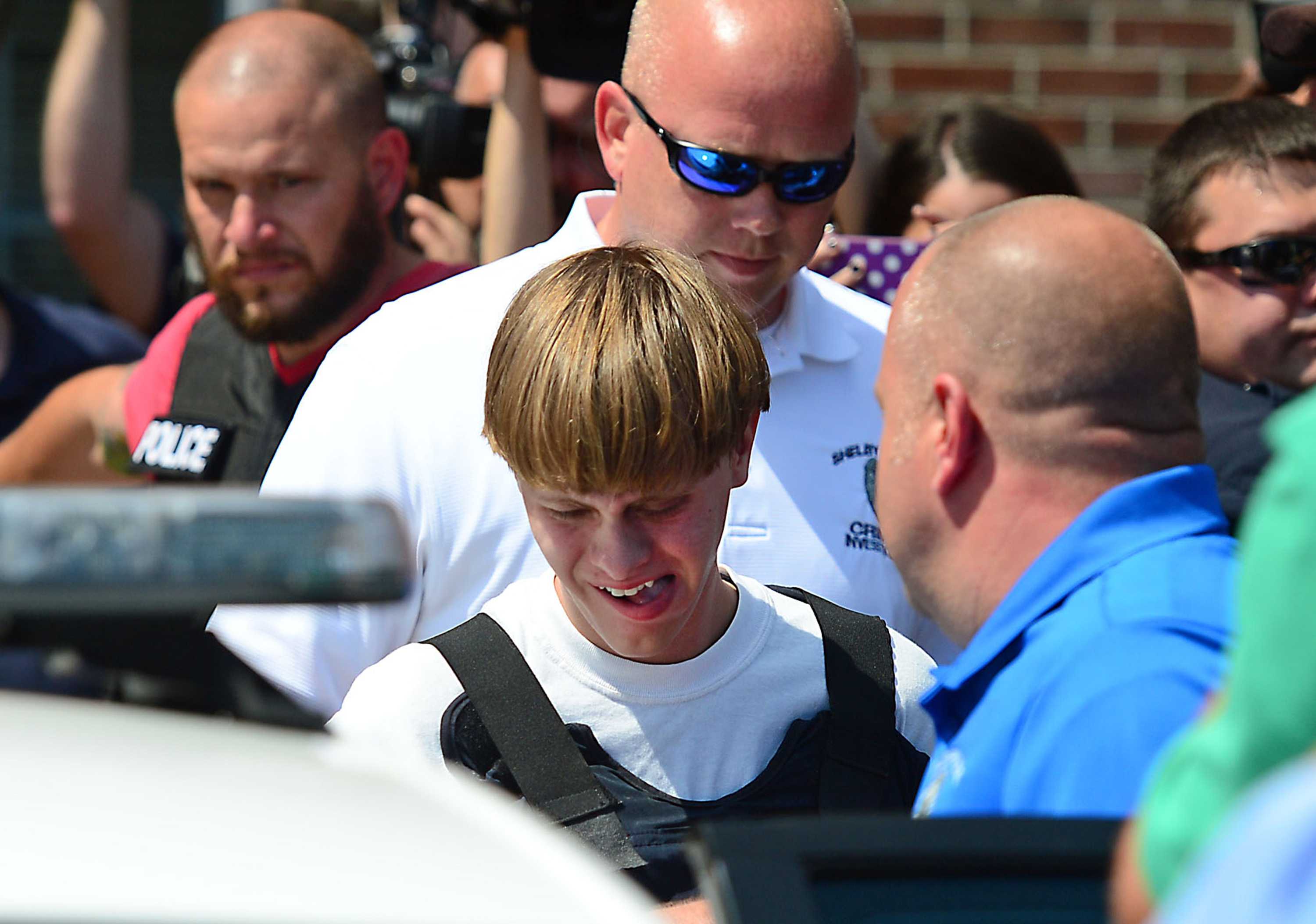

Charleston shooting suspect Dylann Roof is escorted from the Shelby Police Dept. Thursday, June 18, 2015 in Shelby, N.C. (Todd Sumlin/Charlotte Observer/TNS)
“Shooting,” exclaims the headline, sprawled big and wide across the top of the page.
I should be sad, but I feel nothing. Nothing but annoyed. I no longer get a wave of shock or a sense of fear, nor do I wonder how such a thing could happen so close to home. Shootings seem normal.
In psychology, desensitization occurs when actions are so frequently repeated that they no longer evoke an emotional response. Since mass shootings have become so common, our brains are finding them unimportant, and emotional responses to them unnecessary. But the truth is that human lives are undoubtedly relevant, and there is a great need for more emotional responses to them.
For the sake of the memories of the victims and their families and friends, we cannot allow shootings to become commonplace in American society.
According to ShootingTracker.com, a crowdsourced list of news-reported U.S. shootings, there have been 249 mass shootings from Jan. 1, 2015 to Aug. 28, 2015. That’s more shootings than there have been days in that timespan. And for each shooting, there’s about one news report.
The lives lost and tragedies gone by blur into each other. Because of sheer number, news reports depersonalize and decharacterize the victims. More air time is given to the shooter than to the victims themselves — for instance, a simple Google News search will reveal 62,300 results for Charleston, South Carolina shooter Dylann Roof. But the combined results for the individual searches of each of his victims’ names is about half of all of Roof’s, at about 30,000 results. News reports tend to distill the individual victims to a mere body count.
The press gives context to the shootings, but often these explanations feel like excuses. CNN mentions a parking dispute as a possible cause of the February shooting in Chapel Hill, North Carolina. On an August shooting in Salinas, California, an article in the local news, KSBW, described the incident as “purely domestic violence.”
We shouldn’t explain away the victims of homicide. Rather, we should treat their deaths as serious and sordid. Theorizing on the motivation of the act brews sympathy for the perpetrator, not the victims, so dwelling there achieves little.
Our aptitude to respond emotionally isn’t the only thing that plays a role in the future of gun violence in America. But it makes us human and humanly motivated to make positive change when we are disturbed. It plays too key a role in promoting progress for us to overlook it.
Unless we revive our emotional sensitivity to shootings, those who are violence-inclined will be only more free to shoot others in the future. It’s a classic phenomenon — something distasteful evolves into something regular, and because society acknowledges its normality, that something proliferates. That’s fine when we’re talking about relatively harmless things like wearing pajamas in public, but when we’re talking about taking human lives, it’s scary.
When a collective society makes “no big deal” about any sort of action, it adopts a casual attitude toward the violence. It becomes that much easier for members of society to perform that action repeatedly. If we allow this to occur, mass shootings won’t only “feel normal” to see in the news, but they will truly become commonplace, if they aren’t already.
The press focuses on the shooters, not the victims. We can’t allow this to continue to happen if we want to prevent the victims from fading into the backdrop — we cannot regard their daily gunwounds and deaths as facts of life in America. They should always be framed as tragedies.
So, we need to encourage the press to publish more on the victims of these incidents, and resensitize ourselves emotionally to them.
To do so, we should remind ourselves of the value of each individual life involved. When we’re tired of hearing about yet another shooting, we should tell ourselves that the targets could have been someone we love, or even ourselves.
Then, we need to distinguish between the plethora of incidents, victims and criminals. We must not let them blur together. Because it’s easy to support those like us, we need to force ourselves to sympathize with Americans whose backgrounds are unlike our own.
This way, I think we can recover our ability to respond emotionally. We can dig ourselves out of this vicious cycle and prevent more American lives from being shot, hurt and lost.
The next time I see another shooting in the news, I want to feel something. I want to have to swallow back tears, to feel faint with shock and feel my stomach nearly convulse out of sheer disgust. It will take time — perhaps a long time — for us to react that way again, but it’s necessary if we want to save lives.
Mariam is a contributing opinions writer
Write to her at mas561@pitt.edu
Recent Posts
Therese Pitman: Giving back to Pitt’s student-athletes with equality
Pitman is Pitt’s Director of Student Athlete Development where she helps student-athletes navigate their career…
Pitt speech and debate team heads to nationals
The William Pitt Debating Union, Pitt’s speech and debate team, sends students to both in-person…
Visuals: A Year in Review
The visuals desk had an interesting year. In the midst of the 2024 Presidential Election,…
De-stress events across campus offer students a break from studying
During finals week, departments across campus are offering wellness events to help students manage stress…
Pitt students share their summer plans
After a long and strenuous academic year, many students are excited to take a break.…
Column | Collaboration and connection make us better — yes, even in journalism
Today is the last day I will ever do this, and despite the amount of…

